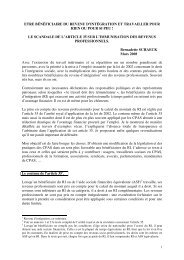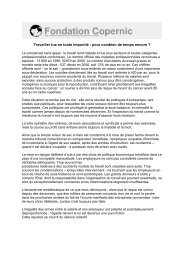Awra Amba RJ 300612 EN - Contacter un comité local d'Attac
Awra Amba RJ 300612 EN - Contacter un comité local d'Attac
Awra Amba RJ 300612 EN - Contacter un comité local d'Attac
Create successful ePaper yourself
Turn your PDF publications into a flip-book with our unique Google optimized e-Paper software.
37 / 85<br />
3. Values and principles<br />
physical capacity and preclude them attending school. Since they are also forced to marry early, they<br />
become pregnant too early, they have pregnancies too close together, with not only a risk of death<br />
during delivery but also a risk of death for children.<br />
For <strong>Awra</strong> <strong>Amba</strong>, “children’s rights are not respected in the Ethiopian society as they should be. Too<br />
often, children are made to do jobs that take no acco<strong>un</strong>t of what they can really do" (Habtamu, 2009).<br />
In the comm<strong>un</strong>ity, the children respect their elders and the elders do the same to the children; there is<br />
no discrimination based on age, but only based on capacity (Yi07/53).<br />
3.2.3. Equality of humans<br />
According to Ya08/26 & 38-41, in Ethiopia, in the past, many groups like smiths, tanners, potters,<br />
woodworkers or weavers have been despised and ostracized, being denied access to land and<br />
livestock and restricted to their craft activities. At the same time, in some cases they are feared and<br />
considered to have links with evil forces, especially the smiths. They can therefore be considered to<br />
have a dual status: economically oppressed, and ritually powerful. To describe them as castes is<br />
therefore quite simplistic.<br />
It is important to remember that the traditional Ethiopian society tends to isolate given groups, which<br />
are not well considered, not according to their behaviour or their personal value, but according to<br />
their trade.<br />
On the contrary, an essential value of <strong>Awra</strong> <strong>Amba</strong> is equality, which obliges to respect the<br />
differences of religion, colour, race, ethnic group, job specification, physical or intellectual capacity,<br />
etc, each human being member of humanity (Ya08/68). The usual hierarchy, which leads to aspire to<br />
move up the social ladder, is replaced by aspiring to social equality through social cooperation and<br />
gender equality (At05/49; Ya08/73). There is no polarization on the comm<strong>un</strong>ity members into those<br />
who command and those who obey (At05/53), since the social recognition is not linked to the social<br />
position or to the job, but to the daily respect of the comm<strong>un</strong>ity values. Then, in order to prevent any<br />
attempt of some ones to seize power over all – any subordination, all committees should be held for a<br />
maximum of 2 or 3 years (see section 4.1) (At05/56).<br />
This value of humanity and brotherhood is extended to <strong>un</strong>iversal brotherhood. Black or white, all are<br />
equal. When Zumra is asked about ethnic affiliations, he simply says, “we belong to every ethnic<br />
group, not one or the other" (Habtamu, 2009). For this reason, foreign visitors pay the same rates as<br />
their Ethiopian co<strong>un</strong>terparts, which is rarely the case in Ethiopia (Jo10b/6).<br />
3.3. Solidarity<br />
"In Ethiopian society, the less fort<strong>un</strong>ate and the old do not have anyone to take care of them. They<br />
may not even have anything to eat or anywhere to live. But the yo<strong>un</strong>g and the stronger ones have a<br />
good time and don’t have time to look after the less fort<strong>un</strong>ate ones", said Zumra (Habtamu, 2009).<br />
On the contrary, solidarity is claimed in <strong>Awra</strong> <strong>Amba</strong>. "From each according to his ability, to each<br />
according to his needs" is its practical translation (At05/53). This principle is in opposition on the<br />
one hand to the capitalist notion and on the other hand to the socialist notion that prevailed in<br />
Ethiopia <strong>un</strong>der the former Derg regime, both pushing to the individual performance, while <strong>Awra</strong><br />
<strong>Amba</strong> pushes to the collective performance through the respect of the common values.<br />
The ownership of the means of production and of the production right-fully belongs to the entire<br />
cooperative, except household properties and activities. The government through its land<br />
redistribution policy allocates the land. But in practice, neither individuals, nor families enjoy it<br />
individually, because enjoyment is collective: the comm<strong>un</strong>ity members work collectively on the land<br />
and they equally share the produce from the land, although they do not contribute to it equally for<br />
capacity reasons. It allows those who are landless to live and reinforces solidarity (At05/51 & 53)

















